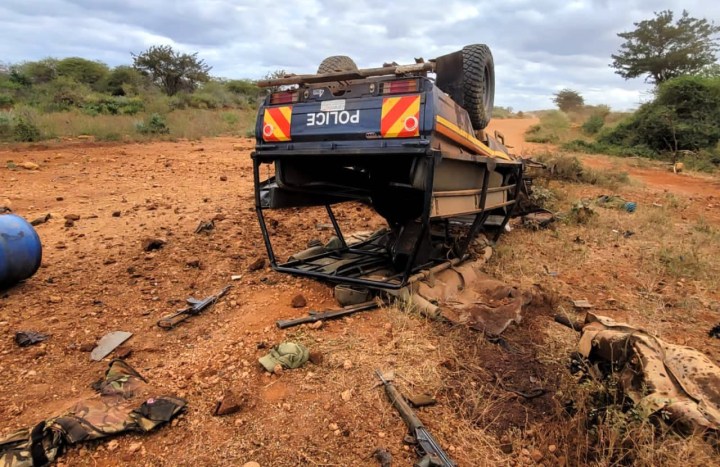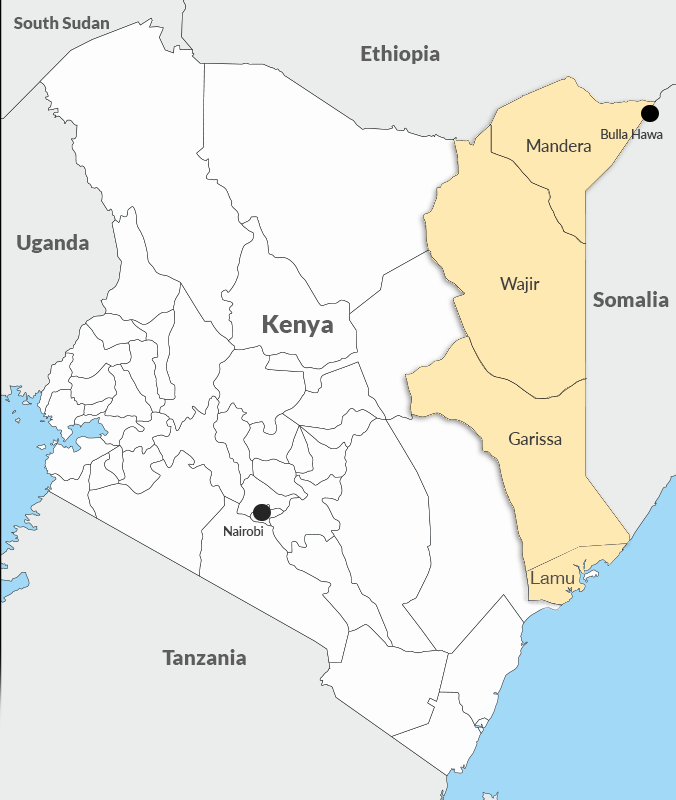ISS TODAY OP-ED
Rise of al-Shabaab attacks in Kenya demands collective response from government, military agencies

County governments and affected communities need more decisive roles in security decisions and resources to empower police reservists.
In the past three weeks, over 30 security force officers have been killed by improvised explosive devices (IEDs) in more than 10 attacks across north-eastern Kenya’s Garissa and Lamu counties. The violent extremist group al-Shabaab is believed to be behind these and other attacks that have occurred over several years.
Two Quick Response Unit officers were killed on 7 June when their patrol vehicle hit an IED at Qurqura in Mandera county. From 7-12 June, several ambushes targeted Kenya Defence Forces (KDF) officers, the Special Operation Group Unit and important infrastructure, including a mine-resistant ambush-protected vehicle.
IEDs have become al-Shabaab’s preferred weapons in Kenya and Somalia due to their portability, easy assembling, devastating impact on vehicles, and the fear they instil in road users. Between 13 and 25 June, the attacks became deadlier, resulting in 20 deaths of KDF soldiers, officers travelling in public service vehicles, and civilians in Lamu and Mandera counties.

Counties in Kenya affected by recent al-Shabaab attacks. (Source: ISS)
After the KDF entered Somalia in 2011 to help fight al-Shabaab, the group demanded Kenya’s unconditional withdrawal. The KDF displaced the terrorist group from the Kismayu port in southern Somalia and other key towns, and after that Kenya’s forces joined the African Union’s (AU) peace support mission in Somalia.
Kenya is one of the key regional partners in Somalia’s stabilisation and reconstruction efforts. Since 2011, al-Shabaab has retaliated by carrying out devastating attacks in Kenya’s frontier counties and against critical infrastructure in its major cities. The group also recruits local youth by capitalising on discontent and discourses of real and perceived historical injustice and underdevelopment in Muslim-majority counties.
Cross-border operations
Kenyan security experts believe the recent surge in attacks could be due to counter-offensives in Somalia by the Somali National Army, KDF, AU peace mission and international partners’ drone attacks. These operations have put al-Shabaab on the back foot, forcing the extremists to take refuge in neighbouring countries. This collaborative effort targeting Somalia’s Jubaland and Southwest states has killed over 3,000 insurgents in Galmadug and Hirshabelle.
Many militants have been displaced or have reportedly escaped to Kenya due to the counter-offensive in south and central Somalia. Intelligence reports claim that small numbers have been crossing the border for weeks, and have joined nearby local communities.
Mathenge Ndung’u of the Kiunga Youth Bunge Initiative says the frequency of attacks in Kenya’s Lamu county is due to poor infrastructure worsened by heavy rains, which makes security patrols difficult. Impoverished youth in the area are also susceptible to payments by al-Shabaab for helping to plant IEDs.
The Kenya-Somalia border posts, which have been closed since 2011, were set for phased reopening between 15 June and 15 August following a ministerial meeting between the two countries on 15 May. But on 5 July Kenya’s government announced that the reopenings would be delayed following the spate of cross-border attacks.
Despite the border closure, movements of people and livestock, and the illicit trade in sugar and other contraband, has continued apace. The long shutdown of border points allowed al-Shabaab to control, impose taxes and raise funds to run its operations through intricate smuggling networks involving traders bringing contraband into Kenya.
Kenyan officials have urged people to come forward with any information about al-Shabaab’s presence, especially following recent allegations of militants joining local communities. Defence Secretary Aden Duale said al-Shabaab sympathisers or people helping the group would “not be spared in the fight against terrorism”. This statement has raised fears of human rights abuses by Kenya’s security agencies — an accusation that has been levelled at them before.
Intelligence gathering
The Kenyan Witness Protection Agency’s 2023-28 strategic plan was launched on 22 June, encouraging civilians to come forward with security-related intelligence. The agency, which is supported by the United Nations Office on Drugs and Crime, aims to protect those “who [face] potential risk or intimidation due to their cooperation with prosecution and other law enforcement agencies”.
But the agency has a long way to go in “ensuring that its existence, mandate and new strategy are known to the public and other grassroots government security and administrative agencies,” says Dominic Pkalya, a Nairobi-based expert in preventing and countering violent extremism. Without interagency collaboration, including with the National Counter Terrorism Center, the strategy may not be very successful, he cautioned.
Regarding military measures to address the al-Shabaab threat, Duale said the KDF would be modernised and police artillery renewed to better counter attacks. The KDF hopes to acquire armoured personnel carriers that can better detect IEDs.
In a recent parliamentary debate, Dido Rasso and Farah Maalim from northern Kenya warned against withdrawing the KDF from Somalia in response to the increase of al-Shabaab attacks. They said this would be counterproductive and may not reduce terror attacks. Building community resilience through intelligence gathering and countering youth radicalisation was preferable they said. They also called for better pay, food and arms for the National Police Reservists, which comprise local communities, to hunt down the jihadists.
Rashid Abdi, a Horn of Africa security analyst, reiterated the need to invest in affected communities, improve socio-economic conditions and reduce the trust deficit between residents and security forces. He said locals needed to play a greater role in security decisions in order to address the community discontent that insurgents often exploit.
This should be backed by Kenya’s county action plans, which include community-led projects and interventions to prevent violent extremism. Better border surveillance and regular on-foot security patrols are also needed.
Kenya also needs to strengthen community policing structures and invest in coordinated multi-agency and cross-border intelligence-gathering. County governments should be given more decisive roles in co-funding local police reservist patrols, sensitising communities and allocating cash to projects that tackle the drivers of radicalisation and recruitment into al-Shabaab. DM
Isel Ras, Research Consultant, Southern Africa, Institute for Security Studies (ISS) Pretoria and Halkano Wario, Regional Organised Crime Observatory Coordinator for East Africa, Enact, ISS Nairobi.
First published by ISS Today.


















 Become an Insider
Become an Insider
Comments - Please login in order to comment.